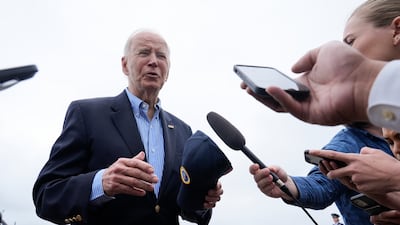Live updates: Follow the latest news on Israel-Gaza
US President Joe Biden has said he would not support an Israeli strike on sites related to Tehran’s nuclear programme in response to Iran firing about 180 missiles at Israel on Tuesday.
“The answer is no," Mr Biden told reporters on Wednesday.
He said the US and its G7 allies are working on a co-ordinated response to Iran's “unacceptable” attack, and cautioned Israel to plan its next strikes "proportionally".
“We’ll be discussing with the Israelis what they’re going to do, but all seven of us [G7 nations] agree that they have a right to respond but they should respond proportionally,” he told reporters before boarding Air Force One. "Obviously, Iran is way off course."
The Group of Seven consists of the US, Canada, France, Germany, Italy, Japan and the UK.
Iran said Tuesday's attack was a response to the killing of Hezbollah chief Hassan Nasrallah in Lebanon and Hamas leader Ismail Haniyeh in Tehran, as well as Islamic Revolutionary Guard Corps commander Abbas Nilforoushan.
Mr Biden called the attack “ineffective,” and Israel's Prime Minister Benjamin Netanyahu has vowed that Tehran “would pay".
On Tuesday, Mr Biden praised American and Israeli militaries for defeating the barrage. He said he would be speaking to Mr Netanyahu soon, but did not say when.
The development comes nearly a year into a devastating Israeli war on Gaza that has so far killed about 41,700 Palestinians, according to local health authorities.
It began on October 7, when Hamas-led attacks on southern Israeli communities killed 1,200 people.
US-mediated efforts to reach a ceasefire in Gaza have stalled, and the prospects of one now is dimmer than ever after Israel invaded southern Lebanon to attack Iran-backed Hezbollah.


